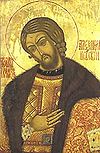- Dmitry Gorchakov
-
Dmitry Gorchakov 
Born January 12, 1758
Kostroma, Russian EmpireDied December 11, 1824 (aged 66)
Moscow, Russian EmpirePrince Dmitry Petrovich Gorchakov (Russian: князь Дми́трий Петро́вич Горчако́в; January 12 [O.S. January 1] 1758, Kostroma, Russian Empire – December 11 1824 [O.S. November 19], Moscow, Russian Empire) was a Russian writer, dramatist and poet, best known for his satyrical verses and three comical operas, staged in the end of XVIII century.[1]
Biography
Prince Dmitry Gorchakov was born in Kostromskaya gubernia, the only son of Prince Pyotr I. Gorchakov, member of an empoverished Russian aristocratic family, the Chernigov's line of Ryurikovichs. He’s got a high quality home education, in 1768 joined the army, took part in Wallachian and Crimean campaigns but in 1782 (for reasons that remained unclear), retired to engage himself in agricultural activities in his Tula estate. It was in the early 1780s that he first started to write poetry.
In 1790 Prince Gorchakov rejoined the Russian army as a volunteer, took part in the battle at Izmail, was seriously wounded and has been highly praized for courage by Aleksandr Suvorov himself. In 1807 Gorchakov was made an honorary Russian Academy member. In 1807-1910 he served as a Governorate procurator in Pskov and Tavria, then as a high-ranked administrative official in the Moldovan army. In 1811 he became the member of an influential group known as Beseda (the Lovers of the Russian Word Meetings). The In 1813 Gorchakov was appointed a vice-Governor of Kostroma, in 1816 he retired and moved to Moscow where he lived up until his death in 1824. Prince Dmitry Gorchakov was buried in the Danilov monastery in Moscow.[1]
Works
Dmitry Gorchakov was best known for his comedy plays King for a Day (Калиф на час, Moscow, 1786), The Happy Tonya (Счастливая тоня,[2] Moscow, 1786) and Baba Yaga (Баба-Яга, Kaluga, 1788). Based on Arab and Russian folklore, but featuring 'modern' characters (with 'character' names like podyachy Bribetakin), these works parodied ways of Russian petty officials, denouncing corruption, bribery and theft.[3] Among his major influences were Derzhavin and also Nikolai Nikolev, a close friend. It was the latter's anti-tyranny tragedy Sorena and Zamir that inspired Gorchakove to write in the late 1880s his pro-democracy, American-based tragedy which remained both untitled and unpublished. Another unpublished "comedy in verse", The Carefree One (Беспечный) was staged in 1799 in Saint Petersburgh. His "Russian life novelet" Plamir and Raida came out in 1796.
A keen analyst of the European political affairs, Gorchakov was regarded in the early 1800s as the leading Russian satirist. Some of his poems were published in the Drug Prosveschenya magazine (in 1804-1806), more of the others circulated privately as hand-written manuscripts, best-known of which was The Epistle to Prince S.N.Dolgorukov which in many ways (notably by bringing to mind the famous Tchatsky's monologue) pre-empted Woe from Wit, Griboyedov's 1823 classic. Young Aleksander Pushkin was much impressed by Prince Gorchakov’s works. In his 1815 poem Gorodok (Small Town) he mentioned him and his satires ("I love your needle-sharp verse..."). Tellingly, in 1828 amidst the The Gabrieliad scandal, Pushkin tried to ascribe his "dirty" poem to Prince Gorchakov, then four years dead, trying to exploit the latter's reputation as the early 1800s Russia's major volnodumetz ("a free-thinking man").[1]
The first ever attempt to collect Gorchakov's legacy was made in 1890 by his grand-daughter Princess Yelena Gorchakova who published The Works of D.P.Gorchakov (Сочинения Д.П. Горчакова). This volume was far from comprehensive, though: none of the earlier publications were included. Large part of Gorchakov's legacy has been lost: a bulk of his unpublished material along with numerous rough copies has perished in the fire that destroyed his country house, while some of poems he did publish remained anonymous.[3]
References
- ^ a b c Т. Г. Петрова. "Источник: "Русские писатели". Биобиблиографический словарь. Том 1. А--Л. Под редакцией П. А. Николаева.". М., "Просвещение", 1990. http://az.lib.ru/g/gorchakow_d_p/text_0020.shtml. Retrieved 2011-01-01.
- ^ Tonya (тоня) - a place for fishing.
- ^ a b "Русский биографический словарь". www.rulex.ru. http://www.rulex.ru/01040628.htm. Retrieved 2011-01-01.
People from Russia Leaders and religious - Pre-1168
- 1168–1917
- 1922–1991
- 1991–present
- RSFSR leaders
- General secretaries
- Soviet premiers (1st deputies)
- Soviet heads of state (and their spouses)
- Prime ministers (1st deputies)
- Foreign ministers
- Prosecutors general
- Metropolitans and patriarchs
- Saints

Military and explorers - Field marshals
- Soviet marshals
- Admirals
- Aviators
- Cosmonauts
Scientists and inventors - Aerospace engineers
- Astronomers and astrophysicists
- Biologists
- Chemists
- Earth scientists
- Electrical engineers
- IT developers
- Linguists and philologists
- Mathematicians
- Naval engineers
- Physicians and psychologists
- Physicists
- Weaponry makers
Artists and writers Sportspeople - Chess players
Categories:- 1758 births
- 1824 deaths
- Russian poets
- Russian dramatists and playwrights
- People from Kostroma
- Russian nobility
- Gorchakov family
Wikimedia Foundation. 2010.
